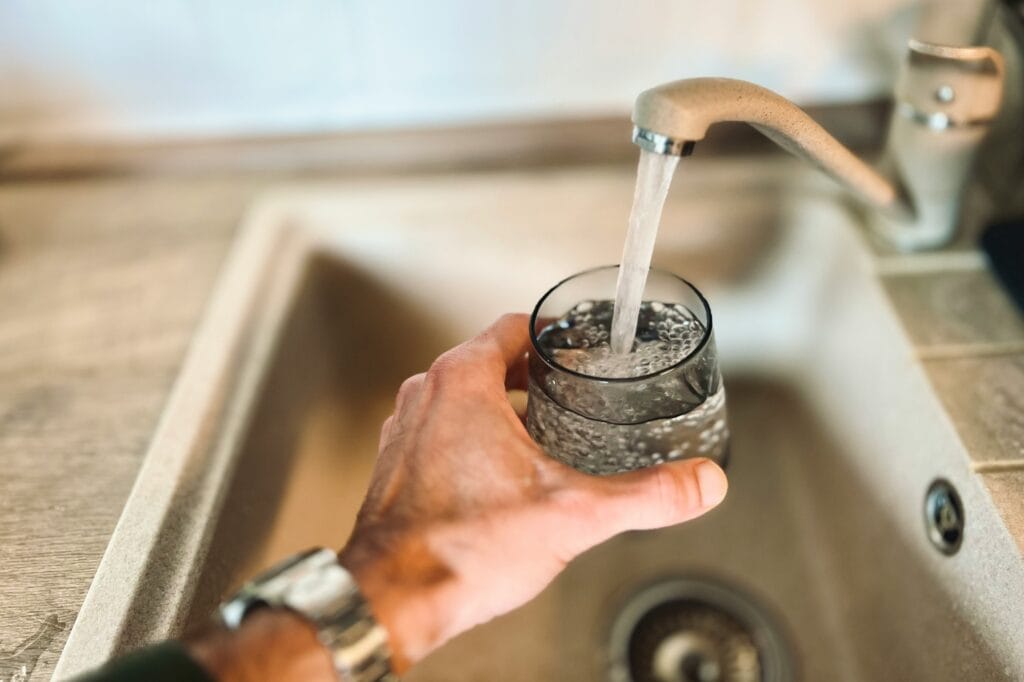From a young age, health professionals, teachers, dentists, and government bodies highlight the importance of drinking plenty of water. For most, the cost of bottled water in the UK is excessive compared to tap water. This is especially the case in poorer communities who rely heavily on tap water. But, with emerging research, it is becoming clear that chemicals and additives to tap water could be harmful to our health – so what chemicals in UK tap water are there?
Let’s explore everything that can be found in your tap water, why water companies add them, and the potential long term harms these additions can pose to our health.
Chlorine and Chloramine Chemicals in UK Tap Water
In the Victorian era, disease was more prevalent in England than it is now, especially water-borne diseases like Cholera and Legionella. Both these diseases are caused by bacteria and can be transmitted by drinking bad (dirty) water.
Chlorine is a potent anti-bacterial chemical and anyone who has ever been to a swimming pool will know the distinctive smell.
Fortunately, the concentrations of chlorine in tap water are far lower than a swimming pool, but you may notice tap water has a different taste to bottled spring water. Sometimes, you may even get the chlorine smell from your water which can signify that there is an unusually high concentration of it in your tap water.
Chlorine in low doses is considered generally safe however there are studies that highlight correlations between chlorine and bladder and colorectal cancer.
This chemical as of the time of writing is considered safe for consumption at the levels found in tap water.
Aluminium-Based Coagulants
Most water contains some metal compounds in very minute amounts. Water companies actually add aluminium-based coagulants to filter the water and remove organic matter and suspended particles.
The most commonly used aluminium in UK water is Poly-aluminium chloride (PAC) as it is very effective at filtering the water. However, on occasion aluminium sulphate is used.
UK water regulation explicitly limits the amount of aluminium that can be added to water and the maximum is 200 micrograms of aluminium per litre of tap water.
This is because aluminium has direct correlation to neurological conditions such as Alzheimer’s and Dementia. It can also have other less severe side effects such as abdominal cramps and constipation.
Aluminium is regulated as an additive to tap water however it is not yet known at what level aluminium is safe to consume and there are still ongoing studies into this. Unfortunately, just because an additive is regulated does not mean you can guarantee good behaviour on the water companies’ part. My verdict on aluminium is it should be prohibited from tap water until we have a better understanding of potential harms.
Fluoride Chemicals in UK Tap Water
States in the US are beginning to ban fluoride being added to water. In the UK, fluoride is added to water in the North-East predominantly with the claim being it improves dental health in poorer communities.
Unfortunately, there is increasing evidence that fluoride has a detrimental impact on IQ scores. A correlation has been shown across multiple studies that indicate fluoride in tap water causes a 2-5 decrease in IQ points.
Alarmingly, the UK government is actually hoping to expand fluoride addition to water.
Not safe and in light of latest scientific literature, it should be removed from tap water. Of course, correlation doesn’t equal causation – but without question, we need more research and information. Especially before expanding the use of fluoride in UK tap water.
pH Balancing Chemicals – Acidity Regulators
The goal is to make tap water pH 7.0 or neutral. Unfortunately, depending on the water source and location of reservoirs, the water can vary greatly in acidity level.
To soften the water, lime (calcium hydroxide) or caustic soda (sodium hydroxide) can be added. If the water is too alkaline, carbon dioxide or sulphuric acid is added.
The amount of whichever chemical is added varies depending on the pH level of the water before processing.
These chemicals are generally okay for health, but too much can potentially lead to complications. On the flipside, not balancing the pH can also have adverse health effects. Overall, these are generally safe in the levels used for water treatment.
Phosphate-based chemicals in UK Tap Water
Water is transported through pipes that can contain lead or copper. Phosphate is added to stop lead and copper contaminating the water as it reaches you.
There is little research on phosphate-based chemicals in tap water, however, lead specifically would be dangerous if it made its way into your drinking glass. It is therefore considered a positive additive because it far outweighs the damage caused by heavy metal contaminants.
Safe at treatment levels and even if it wasn’t the contaminants, it removes are far more dangerous.
PFAS (Per- and Polyfluoroalkyl Substances)
In 2024, the Drinking Water Inspectorate put a new limit of 100ng per litre of tap water on PFAS. These are what’s known as forever chemicals that build over time. This accumulation has serious impact on our health including raised cholesterol and weakened immune systems.
Despite this much stricter limit, heavy consumers of tap water are still exposing themselves to risk because these chemicals don’t break down in the body and stick around for the long haul – causing damage eventually.
PFAS are completely unsafe to consume and there should be an effort to ban them from tap water altogether.
Final Consideration – Microplastics
Believe it or not, microplastics are prevalent in tap water (as well as bottled water). The level of microplastics polluting our water is increasing year on year.
Microplastics trap other chemicals which can in turn be harmful. Though potentially dangerous, removing microplastics is a difficult water-engineering problem to fix and it is being worked on as we speak.

Are Chemicals in UK Tap Water Safe?
It is always going to be a balancing act when considering how safe it is to drink tap water. First and foremost, some chemicals are added because without them, the harms are significant. Chlorine for example is not particularly appetising however it prevents fatal water-borne diseases.
Fluoride on the other hand is added for dental health, and given the health implications coming to light, it is hard to justify the risk vs reward of adding fluoride to water.
Water companies, the government and regulators should be more proactive in assessing which chemicals to add and conduct better risk/reward assessments. You might believe they are already doing this, especially with various rules and limits being put in place for certain additions.
The fact fluoride is potentially going to be expanded across water supply in the face of critical scientific evidence is proof enough that the government is not going far enough in its risk assessments.
Home Solutions – Remove Chemicals in UK Tap Water
If you’re concerned about the chemicals in tap water but don’t want to continuously buy bottled water (which sometimes has some of the same issues outlined above), you can by at home filtration systems.
These can range from fully integrated filter systems that connect to your pipes and provide pure water throughout your house to simple countertop filtration accessories that do the job just as well. Surprisingly, the cost of a countertop filter is very economical, and they provide you with pure drinking water as and when you get thirsty.
There are factors to consider when choosing a tabletop water filter. Some only filter out PFAS, so if you want to filter everything out you will need to spend more money. PFAS filters are inexpensive, ranging from £30 to £100. Fully fledged water filters that use reverse osmosis can cost up to £1000.
Picks for In Home Water Filters
The best value PFAS water filter is the Brita Maxtra Pro which targets PFAS and micro-contaminants as well as reducing chlorine. At an RRP of £37.49 you will be hard pressed to find a better water filter – and occasionally it is discounted to as little as £24.
It will not completely purify your water, instead it is designed to filter as much as possible.
If you want to completely filter your water of contaminants, you will need a water system that uses reverse osmosis. This will remove the PFAS mentioned above as well as fluoride and chlorine completely from your water.
The Frizzlife WB99 Reverse Osmosis system has an RRP of £599.99 but is often discounted to around £450, looks sleek, and fits most kitchen aesthetics. It also provides extremely pure drinking water at the push of a button.





